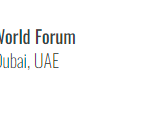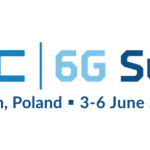
- This event has passed.
6GArch – 4th International Workshop on 6G Architecture – Call For Papers

10th edition combined with 5GArch Workshop Series
In conjunction with IEEE Globecom 2024, Cape Town, South Africa, 8-12 December 2024, https://globecom2024.ieee-globecom.org/
This workshop is organised by the SNS JU 6G Architecture work group.
– Objectives – Call for Papers – Important Dates/Submit a Paper – Workshop Organisers/Committee – Tentative Program – Past Editions
1. Objectives of the workshop
Since the early generations, mobile and wireless communications systems have played a crucial role in establishing essential connectivity. They have facilitated easy access to information anytime and anywhere, leading to accelerated knowledge build-up and value-added actions across various sectors of society. The significance of wireless communication infrastructure has been further highlighted during the COVID-19 pandemic, as it has supported global stability and faster recovery by maintaining a stable technological environment and seamless societal connections despite quarantine regulations.
Recognizing the critical role and importance of mobile and wireless communications, advancements in the telecommunications ecosystem are captured through non-backward compatible features specified in a new generation of mobile and wireless communications systems. Transitioning from one generation to the next requires significant efforts, and the justification for a new generation must consider technical, societal, and economic factors. These factors are interconnected, meaning that advancements in any of these areas can accelerate the overall process. For example, the need to explore new business areas also entails supporting a diverse set of requirements.
In this context, 3GPP standardization has progressed rapidly, and more 5G system enhancements are reaching maturity with the completion of Release 17, while Release 18 is marking the start of 5G-Advanced. Release 19 is underway to provide a guidance on what future the 6G system needs to be capable of, and Release 20 is in preparation. At the same time, the Smart Networks and Services (SNS JU) in Europe, under the Horizon Europe program for Research and Innovation, has started to date more than 60 project in Phases 1 and 2, and more projects are underway. The European SNS JU program is a joint initiative between the private and the public side and focuses on 5G-Advanced and 6G.
To address the architectural evolution towards 6G, the SNS 6G Architecture Working Group (WG) has evolved from the 5G PPP Architecture WG, which has issued several white papers and an open-access book, with the latest one specifically focusing on this workshop’s topics. The workshop aims to discuss novel key architectural innovations required for future 6G mobile telecommunications networks. It also provides a platform for projects working on long-term innovations and formulating research items under the 6G theme to share their visions, requirements, and architectural considerations for future mobile systems.
The thematic topics of the workshop revolve around technology enablers and design recommendations, facilitating the transition from 5G-Advanced towards a fully-fledged 6G architecture. These topics will encompass areas such as network infrastructure, spectrum utilization, connectivity, scalability, sustainability, security, as well as joint/integrated communication and sensing, among others. The workshop will source from the very vibrant SNS JU research community that is already working on the topics, providing reference architectural solutions.
In summary, the rapid progress in mobile telecommunications has demonstrated their crucial role in establishing connectivity and fostering knowledge sharing. The ongoing efforts in 5G standardization, the SNS JU projects (and previously the 5G PPP projects), and the upcoming focus on 5G-Advanced and 6G research indicate the industry’s dedication to advancing mobile telecommunications systems. The workshop aims to explore architectural innovations and provide a collaborative platform to shape the future of mobile telecommunications systems.
2. Call for Papers
As we witness the continuous strides toward the next generation of mobile network architectures, there arises a critical need to discuss and consolidate architectural perspectives toward the definition of the 6th Generation of Mobile Network Architecture.
This involves encouraging researchers and engineers to contribute and exchange their insights and visions on various topics such as infrastructure, spectrum utilization, connectivity, scalability, sustainability, and security, among other key areas.
In the 6GArch workshop, we delve into the evolving landscape of mobile and wireless communications systems, calling for contributions on these emerging topics that are paramount to the definition of future mobile communications. Both theoretical and more applied contributions are solicited, covering, but not necessarily limited to, the following topics:
- Cognitive, automated, and specialized architectures.
- Architectural simplification.
- Network Monetization.
- 5G to 6G Migration.
- APIs and Exposure Framework.
- Network Digital Twins.
- New spectrum technologies, e.g., midband, terahertz, and beyond frequencies and related channel models.
- Reconfigurable Intelligent Surfaces (RIS).
- Spectrum efficiency and spectrum re-utilization.
- Joint-/Integrated Communication and Sensing (JCAS, ISAC).
- Inherent AI-driven network governance and management.
- Evolution of multiaccess communications (ATSSS) towards 6G.
- Architectural enablers for cloud transformation in 6G.
- AI/ML empowered RAN Intelligent optimization including native AI-based air interface design.
- Dynamic dependability and high resilience.
- Time-sensitive wireless/mobile networks.
- High-resolution localization.
- E2E Network Slicing and Deep Slicing to support diverse verticals.
- Open Testbeds and facilities to assess new technology enablers.
- Non-terrestrial and 3D networking.
- 6G architectural enablers and key metrics for an energy efficient and sustainable 6G system.
- Industry landscape and Standardization efforts for intelligent and cloud-based RAN.
- Testbeds/Experimentation to validate or support the intelligent and cloud-based RAN.
- The role of architecture towards sustainable 6G
- The role of 6G for sustainability in the vertical industries
3. Important dates
See also deadlines at https://globecom2024.ieee-globecom.org/
Workshop Paper Submission Deadline: 5 August 2024
Paper Acceptance Notification: 1 September 2024
Camera Ready: 1 October 2024
4. Submit a paper
Paper submission will be through EDAS (link to be announced). https://edas.info/newPaper.php?c=32682
5. Workshop organisers:
This workshop is organised by the SNS JU 6G Architecture work group.
- Anastasius Gavras, Eurescom GmbH
- Marco Gramaglia, University Carlos III of Madrid,
- Ömer Bulakci, Nokia
- Xi Li, NEC Laboratories Europe
6. Program committee members:
- Prof. Dr. Marco Gramaglia, University Carlos III of Madrid, Spain
- Dr. Ömer Bulakci, Nokia, Germany
- Anastasius Gavras, Eurescom GmbH, Germany
- Dr. Xi Li, NEC Laboratories Europe, Germany
- Dr. Mikko Uusitalo, Nokia Bell Labs, Finland
- Dr. Mir Ghoraishi, Gigasys Solutions, UK
- Prof. Dr. John Cosmas, Brunel University London, UK
- Mårten Ericson, Ericsson, Sweden
- Dr. Bahare Masood Khorsandi, Nokia, Germany
- Dr. Agapi Mesodiakaki, Aristotle University of Thessaloniki, Greece
- Dr. Dimitris Tsolkas, Fogus Innovations & services P.C., Greece; and the National & Kapodistrian University of Athens, Greece
- Prof. Dr. Haeyoung Lee, University of Hertfordshire, UK
- Giada Landi, Nextworks, Italy
- Håkon Lønsethagen, Telenor, Norway
- Dr. Apostolis Salkintzis, Lenovo, Germany
- Dr. Chathura Sarathchandra, InterDigital, UK
- Dr. Nikolaos Bartzoudis, Centre Tecnològic de Telecomunicacions de Catalunya (CTTC/CERCA), Spain
- Harilaos Koumaras (NCSR Demokritos|FRONT Research Group)
- Dimitris Fragkos (NCSR Demokritos|FRONT Research Group)
- George Makropoulos (NCSR Demokritos|FRONT Research Group)
- Ilias Alexandropoulos (NCSR Demokritos | FRONT Research Group)
- Nikos Gkatzios (INFOLYSIS PC)
7. Tentative Program
| Time | Title | Notes |
| 9.00 – 9.10 | Welcome Session | Introduction by Workshop chairs |
| 9.10 – 10.00 | Keynote 1 | TBA, 35 mins + Q&A |
| 10.00 – 10.30 | Technical Session 1 | 2 Papers, 15 min each including Q&A |
| 10.30 – 11.00 | Coffee Break | |
| 11.00 – 12.30 | Technical Session 2 | 6 Papers, 15 min each including Q&A |
| 12.30 – 14.00 | Lunch Break | |
| 14.00 – 14.50 | Keynote 2 | TBA, 35 mins + Q&A |
| 14.50 – 15.30 | Panel | Sustainability in 6G Networks, an architectural view |
| 15.30 – 16.00 | Coffee Break | |
| 16.00 – 17.15 | Technical Session 3 | 6 Papers, 15 min each including Q&A |
| 17.15 – 17.30 | Concluding Remarks | Conclusions of the session by Workshop chairs |
We expect a total of around 30 submissions out of which 12-14 papers will be selected (yielding an acceptance rate of around 40%, which can be adjusted in line with the conference guidelines). With the appropriate publicity plan, discussed below, we expect to get between 40 and 60 attendees. We plan to invite two keynote presenters; one from industry and one from academia, to provide a forward looking perspective on innovation and forward looking research challenges.
Panel: This session will take the form of an interactive question-and-answer session in which invited panelists will answer questions from the chair and the audience. Panelists will be selected among the organizers and the TPC members. The topic will be “Sustainability in 6G Networks, an architectural view”, owing to the large interest that the topic has been raising during recent years.
8. Past editions
The 6GArch workshop is a continuation of the 5GArch Workshop. The list below provides details on the previous editions:
8.1 9th (3rd 6G)
- Workshop on 6G Architecture (3rd 6GARCH)
- In conjunction with IEEE WCNC, 21-24 April 2024, Dubai, U.A.E.
- https://wcnc2024.ieee-wcnc.org/workshop/ws-12-6garch-3rd-workshop-6g-architecture
- https://wcnc2024.ieee-wcnc.org/workshop/ws-12-6garch-3rd-workshop-6g-architecture/program
8.2 8th (2nd 6G)
- Workshop on Archtectural Evolution Toward 6G Networks (2nd 6GARCH)
- In conjunction with IEEE Globecom, 4-8 December 2022, Rio de Janeiro, Brazil
- https://globecom2022.ieee-globecom.org/workshop/ws18-2nd-workshop-architectural-evolution-toward-6g-networks-6garch
- https://globecom2022.ieee-globecom.org/workshop/ws18-2nd-workshop-architectural-evolution-toward-6g-networks-6garch/program
8.3 7th (1st 6G)
- Architecural Evolution Toward 6G Networks: A European View
- In conjunction with IEEE 5G World Forum, 13-15 October 2021, Virtual Conference
- https://attend.ieee.org/wf-5g/architectural-evolution-toward-6g-networks-a-european-view/
8.4 6th
- International Workshop on 5G Architecture
- In conjunction with EUCNC 2019, June 18-21 2019, Valencia, Spain
- https://www.eucnc.eu/2019/www.eucnc.eu/workshops/workshop-8/index.html
8.5 5th
- International Workshop on 5G Architecture (5GArch 2018)
- In conjunction with IEEE ICC, 20-24 May 2018, Kansas City, USA
- https://icc2018.ieee-icc.org/workshop/5th-international-workshop-5g-architecture-5garch/program.html
8.6 4th
- International Workshop on 5G Architecture (5GArch 2017)
- In conjunction with IEEE ICC, 21-25 May 2017, Paris, France
- https://icc2017.ieee-icc.org/workshop/5garch-2017-4th-international-workshop-5g-architecture/program.html
8.7 3rd
- International Workshop on 5G Architecture
- In conjunction with EUCNC 2016, 27-30 June 2016, Athens, Greece
- https://www.eucnc.eu/2016/www.eucnc.eu/indexe1e4.html?q=node/110
8.8 2nd
- Workshop on 5G Architecture (5GArch 2016)
- In conjunction with IEEE ICC, 23-27 May 2016, Kuala Lumpur, Malaysia
- https://icc2016.ieee-icc.org/content/workshops.html#W01
8.9 1st workshop
- 5GPPP Architecture workshop (5GArch 2015)
- In conjunction with IEEE VTC-Spring 2015, EU FP7 METIS and iJOIN projects, 11-14 May 2015, Glasgow, U.K.
- https://www.ieeevtc.org/vtc2015spring/workshops.php#wkshp_4
- https://eit.rptu.de/fileadmin/funknavi/HTML/5G_Arch/index.html
- Programm of the main conference https://www.ieeevtc.org/vtc2015spring/final-program.pdf



